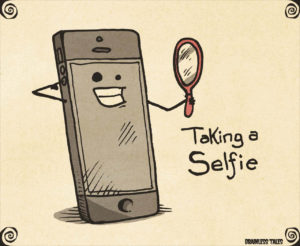How much information do you share about yourself online? On your personal Facebook, Twitter, Instagram, and other social media accounts, how large of a window do you let into your life?
Posting personal photos and updates on social media is nothing new or unusual. If you do it, you are among millions of other users worldwide who share some elements of their private lives on a public platform. When this becomes an issue, however, is if the presentation of yourself on social media – whether through group photos, self-taken images or “selfies,” or written posts – is vastly different from the image you try to cultivate in the workplace.
“But this is my personal profile,” many have argued. “I have a separate profile for my work-related tweets and Facebook posts.” This may be the case, but lines become blurred between personal and professional on social media. A boss, client, or potential employer could have access to both – and it may not work to your advantage.
- Be Careful What You Selfie For
In some cases, the selfie and its subjects have acquired a connotation of being self-centred, overly indulgent, and simply unnecessary. Aside from this annoyance that some people feel when viewing the selfies of others, such images can harm the photographer if they reveal him or her participating in inappropriate behaviour.Although selfies have become normalized and encouraged – there is now even a professional camera designed for taking selfies – be wary of your own selfie-image and how often you post them. Before posting a selfie to social media, ask yourself if it aligns with the image you present in the office. One useful tip is to think of an actual person in your professional circle – whether an employer, client, or otherwise – and ask yourself whether you would mind if that individual saw the selfie you were about to post.
- Don’t Compromise Your Reputation
Reputation is an indispensible component of Executive Presence. However, even if you have worked for years to build up a flawless reputation in the boardroom, inappropriate online posts or images on personal accounts can shatter that reputation in an instant. Although you can heal a bruised reputation, it takes much more time and effort than maintaining a good reputation in the first place.Not only can questionable images hinder your reputation, but also hateful or negative written posts can do damage as well. Even something that seems like a harmless complaint can have a massive effect, especially if it is related to your company or line of work.
- First Impressions Are Not Always in Person
First impressions do not always occur face-to-face. In fact, an increasing number of employers admit to reviewing job candidates’ social media accounts before hiring. According to a 2014 Jobvite poll, some employers not only factor in appropriate images and posts, but also details such as spelling and grammar.If you are concerned about your online first impression, take steps to improve its quality – or limit its accessibility. If others tag you in images you would not like to be widely available, remove the tag and ask friends not to tag you in the future. Increase the privacy settings on your Facebook account and consider making your Twitter private as well.
Remember that if your social media accounts are widely accessible, there is no difference between your professional and personal image – anyone can see both. For more on social media and professionalism, see our previous posts “Dining Etiquette in the Age of Food Selfies” and “Spring Cleaning for Your LinkedIn Profile.”





